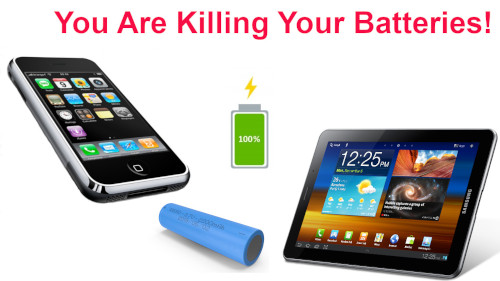STOP Killing Your Batteries With These Simple Tips
STOP Killing Your Batteries With These Simple Tips
Just about everyone is killing their Lithium Ion batteries and most do not even know it. This includes cell phones, laptops, tablets, cameras, DIY powerwalls and just about anything that has a Lithium Ion battery inside it.
With a few simple guidelines on using your Lithium Ion battery powered devices you can increase the cycle life (life span) of your device by many years.
Most Lithium Ion batteries have a cycle life of about 500 cycles. This comes out to about two years with regular use such as in a laptop or cell phone. But we can greatly extend the battery life with the methods shown here.

You Are Killing Your Batteries!
Most of the devices we use today give you access to 100% of the battery capacity. This means that you can charge your cell phone for example up to 100% and run the battery all the way down until the phone shuts off. There are some protections in place to prevent battery self destruction but at that point you are already reducing the battery life.
First let us cover battery percentage. Your device display shows battery capacity in percentages. Your phone for example shows anywhere from 100% (fully charged) all the way down to about 12% (just before it shuts itself down). Generally your device will shut down to prevent total battery failure at some low % level.
By the way, I have over 5,000 Lithium Ion batteries in my lab now. I got them all from Battery Hookup. Click the banner above, use the discount code and save 5% on your next purchase of new or used batteries.
How To Extend Battery Life
A website called Battery University has extensive studies on all types of batteries. But we are looking at Lithium Ion batteries for now. On their site they show that for every 0.1 Volt (1/10th of a Volt) that we reduce the peak charge Voltage of a battery, we double the life cycles.
In simple terms this means that if we remove the charger from our device before it hits 100% we can extend the battery life exponentially. But there is more. Please read on.
Lithium Ion batteries are rated for a peak maximum charge voltage of 4.2 Volts. But this does not mean that we should always charge up our batteries to this level. This is the peak maximum allowed voltage. At the peak maximum levels we can expect up to 500 cycles from our battery. Note: UP TO 500 cycles. This is no guaranty. In most cases it will be much less. Read the full article to understand more.
So, if we stop charging at 4.1 Volts instead we can expect up to 1,000 cycles from the same battery. And if we stop at 4.0 Volts instead we can expect up to 2,000 cycles. This is a huge increase in cycle life (life span) of your battery.
Taking our cell phone again as an example we can normally expect 1 to 2 years of use from the battery before it wears down and has to be replaced. Since phones have a built in battery now this means that we have to buy a new phone every year or so. Cell phone companies are happy with this because it increases sales.
So from now on just disconnect the charger from your device before it reaches 100% for longer life. I charge my phone to 80 or 90% every day. It does not have to be exact and perfect every time. And if you dont catch it one day, do not worry, its not the end of the world - or your battery. Because there are more things we can do to extend the life of the battery as well. Read on...
Another Way To Extend Battery Life
You can also extend battery life by not discharging it all the way down. Instead of running your phone or other device until the battery runs down and shuts off your device, charge it back up at around 30 or 40% each day instead. Just as not fully charging your device can extend the battery life, so does not running it all the way down. Even keeping your device at 20% minimum charge will make a difference.
If you can keep your device from running the battery down all the way, you greatly increase the life of your device.
Again, if you run a bit lower one day, do not worry because there are more ways to increase battery life. And if you are doing all of these combined, you will see a huge increase in battery life cycles over all. Nobody is perfect and we will miss a day now and then.
And Yet Another Way To Extend Battery Life
There is one more thing you can do to extend the life of your battery. Keep it cool. Just keep it cool at all times and do not let it overheat. Never put your device in the hot sun in a car or on the beach. Never leave it in a hot room. Never let it get hot anywhere. If at the beach throw a towel over it. Don't leave it in a hot car, especially on the dash in the sun. This bakes the battery and greatly reduces its life.
Apply these three things and you can greatly extend the life of your Lithium Ion battery.
Off Grid And DIY Applications
You can apply the same battery saving methods I have shown above to your off grid and DIY Powerwall applications. For off grid, hobby or whatever. If you have Lithium Ion batteries these methods can extend the life of your batteries.
BUT THERE IS ONE HUGE PROBLEM....
Almost every single charger on the market will destroy your batteries. They are all hard wired to stop charging at 4.2 Volts. As I said in the video these are absolute maximum manufacturers specs for the battery. Just because your car can go 150 mph does not mean you should.
Almost all chargers, solar charge controllers and charging circuits are hard wired to stop charging at 4.2 Volts. This is quite frustrating. Sure there are some complicated battery chargers that you can program but they cost a lot and need all kinds of special wires and connections in order to work.
For the DIY Powerwall crowd it would be nice if we all had charging circuits like the TP4056 that stops charging at whatever voltage YOU want. Just imagine one with a jumper to stop at 4.0 or 4.1 Volts. Or even 4.2 Volts for those who want maximum power instead of long battery cycle life.
I am working on such a device.
For off grid homes we face the same issues. Almost all solar charge controllers for Lithium Ion batteries are hard wired to stop charging at 4.2 Volts - the maximum allowed manufacturer rated voltage. For long cycle life and many years of use we should stop charging at 4.0 Volts for home solar and off grid use.
There are some, very rare, solar charge controllers which will allow you to terminate charging at a programmable voltage. Look for these. But there are other issues with solar charge controllers I will cover in a future article and video soon.
One More Thing - Storage
When you store your Lithium Ion battery or device there are a couple points which can extend the life of your battery.
Charge the battery to 80% for storage for longest shelf life. A Lithium Ion battery lasts longer when put away at 80% of charge. Anything over that can reduce the life of the battery.
You need to find a charger with a storage setting. There are some out there. Again, most are not so easy to use. A simple jumper would be nice.
Temperature is another killer of Lithium Ion batteries. Reducing the storage temperature of your battery can greatly extend its life. Anything below room temperature is best. A dry container in a basement would be optimum. There is no need to freeze your battery but around 50 degrees F would be great for long shelf life.
I have been conducting long term experiments with batteries that were made way back in 2011. We have all been told that these are useless due to their age and shelf life. But this is not always true. It all depends on how the batteries were stored or used.
Some of the batteries in my experiments are coming up to nearly new capacity. This is amazing. But that video and article are coming later when I complete the tests.
One last point about storage. Once every few months recharge the battery back to 80% because batteries have a small internal self discharge. If left alone too long they can be damaged from over discharging and become useless.
You can watch the video here:
Please feel free to join the forum and share your ideas and experiences: The Do It Yourself World Forum
About the Author
| Troy Reid |




